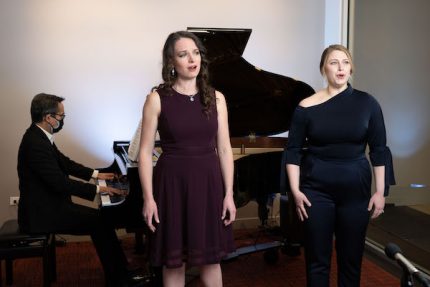Female voices lead off Fourth Coast Ensemble’s streaming season

As the pandemic shutdown continues, many ensembles around the country have found innovative ways to present concerts. One of them is Fourth Coast Ensemble, Chicago‘s enterprising vocal quartet, which opened its 2021 virtual season Saturday night with an adventurous program.
“Origin Stories,” a three-concert series the ensemble is offering online this spring, offers works that explore stories about the cosmos, earth, and humanity. But the wide range of repertoire is what ultimately made the first of these events so appealing. Saturday’s streamed duo recital from the Lyriq Music School featured Fourth Coast’s female members in songs by Jake Heggie and Benjamin Britten alongside music of Lori Laitman, Stacy Garrop, Gilda Lyons, and James Kallembach.
Heggie’s arresting and memorable music often bears a soulful, even bluesy, style. Yet the texts he sets often reveal intimate emotions. “Motherwit,” from his 2007 cycle Facing Forward/ Looking Back, tells of the pain an adult daughter feels while wishing her mother were still alive.
In Saturday’s performance, soprano Sarah van der Ploeg and mezzo-soprano Bridget Skaggs complemented each other’s voices with natural ease. Singing with a radiant voice, van der Ploeg’s captured a daughter’s yearning, while Skaggs’s dark, ringing mezzo brought a tender maternal expression.
Selections from Heggie’s Eve-Song, a cycle depicting Eve’s experiences in the Garden of Eden,were just as compelling. Van der Ploeg was a fitting Eve, powerfully conveying the temptation of the unknown and the longing for better days after the garden’s innocence was lost.
The congenial warmth of “Even” from the set made vivid her memories of Eden while pianist Kuang-Hao Huang supplied gentle support. “Listen,” which told of the serpent tempting Eve, was aptly seductive as van der Ploeg portrayed the thoughts of both characters. “Snake,” rendered with confidence, brought a jazzy, coquettish conclusion to the set.
Heggie’s “Once Upon a Universe” made for a humorous departure. Mezzo-soprano Skaggs varied and colored her tone to depict the story of God, a mere child in the text, as he played with and destroyed his creation.
The evening’s richest musical discovery was Lori Laitman’s One or Two Things, a song cycle that combines sweeping melodic grandeur with thorny harmonic writing. Skaggs found both the urgency and restraint in “Don’t Bother Me.” “The God of Dirt” lingered appropriately, with Huang’s colorful sonorities at the piano adding shades of bleakness. “One or Two Things” took on discordant sonorities without losing its melodic quality, Skaggs’s voice floating effortlessly throughout.
Some of the songs on the program explored the singers’ family background. Van der Ploeg presented Catharina van Rennes’s De Kleengedichtjes, a collection of Dutch songs noteworthy for their simple, attractive, lyrical quality.
The soprano rendered “Wiegedeuntje” with phrases that seemed to hover over Huang’s rollicking piano accompaniment. “Zacht is uw hand” had the grace of a lullaby. Though brief, “Komt o Zonne” sounded with bold declaration. “Mij spreekt de Blomme” and “Als de Ziele luistert” each had the warmth of a fond memory.
Skaggs offered a selection from Gilda Lyons’s Irish Songs to explore her Irish heritage. “The Praties,” an unaccompanied song for both singers, took on a toe-tapping energy even as the text told of the horrors of the Great Famine.
Selections from Benjamin Britten’s British folksong arrangements had similar depth and irony. Skaggs revealed the pent up longing of “O Waly, Waly.” “Come You Not from Newcastle” bounded delightfully, as did “Oliver Cromwell,” which took on sly humor.
Other songs carried an environmentalist message. Stacy Garrop’s “Binsley Poplars,” a lament for the disappearance of trees, featured both singers in long, wailing statements that came to rest on biting dissonances. Garrop’s “A child said, What is grass?,” a setting from Walt Whitman’s Leaves of Grass, captured the poem’s childlike innocence, rendered all the more vivid by Huang’s rolling chords.
James Kallembach’s Weightless Dreams turned attention to human heroism. Written in a colorful lyrical style, the powerful songs of this set relay texts from interviews and blog posts that female astronauts wrote while working at the international space station.
Each song told of the awe experienced while viewing the earth from a distance. Van der Ploeg found the initial reluctance and ultimate assurance of “Cady Coleman.” Two songs about Sally Ride ventured from hymn-like solemnity to wry humor as the astronaut refused a bouquet of flowers when she returned to earth. Performing with the wit of a stage actress, van der Ploeg delivered the punch line—“She just wanted her hands free”—with a hint of defiance.
Skaggs fully captured the haunting beauty of “Peggy Whitson.” She was a similarly soothing vocal presence in “Sunita Williams,” which unspooled in gently flowing lines.
The technical quality of the livestream was excellent throughout. The small room’s clear acoustic allowed the voices and piano to resonate naturally. Camerawork was handled artfully, focusing on the singers at different angles as each depicted different characters.
The encore, Gilda Lyons’ “The Parting Glass,” brought much needed joy for this difficult time.
The stream will be available through Monday. Go to fourthcoastensemble.com
Fourth Coast Ensemble’s “Origin Stories” continues 7 p.m. March 20 in a livestream with tenor Ace Gangoso and bass-baritone David Govertsen in music of Schumann, Grieg, Heggie, Garrop, Florence Price, and others. fourthcoastensemble.com
Posted in Performances




